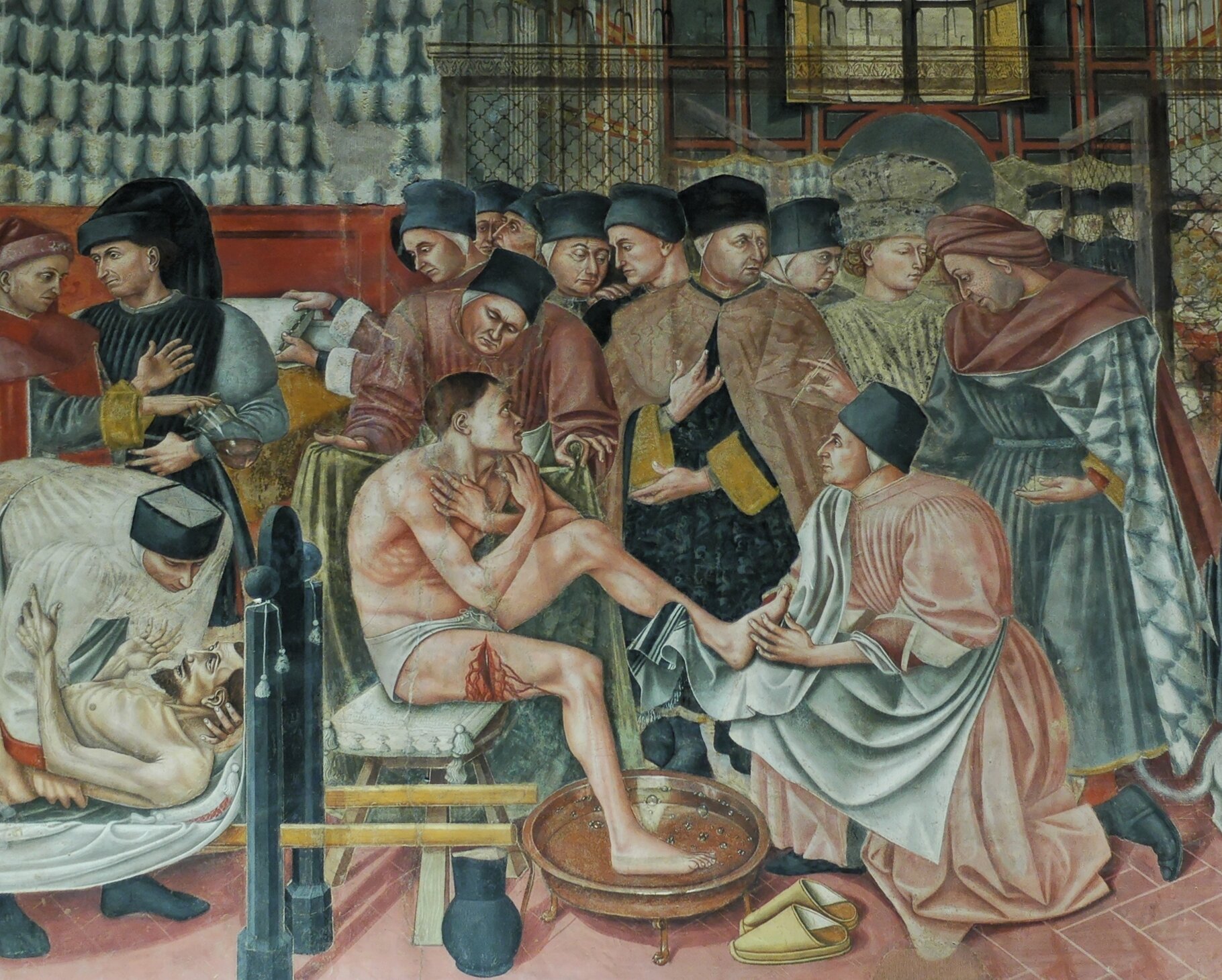Of Our Own Medicine

Let's talk about medicine in a pre-pharmaceutical company world.
Back when I was a medical student, I spent two months rotating through several pediatric services, including four weeks on an inpatient ward. The attending staff was a rather eccentric woman who had a particular teaching exercise she did with all her students. She brought the four of us to a conference room and gave each person a tray with numerous syringes, each of which contained about 0.1ml of liquid medication... a meaningless dose. Each student was required to taste all fifty medications and rate the flavor. See, in pediatrics, a lot of kids can't swallow pills, and have to take their medications as syrups, and so the object of the exercise was to remind us that to us, a drug was just a word we scribbled on a piece of paper, but to a patient, a drug was a thick, gooey resin that tasted like poison. You can extend that logic to any medication side effect, and to quite a lot of other situations in life besides.
With all that in mind, let's talk about medicine in a pre-pharmaceutical company world.
Medication is a staple of the modern world. For better or for worse -- and intelligent arguments can be made for either case -- medication is everywhere. If you're over thirty, probably about half the people you know currently take a pill every day, or have had at least a two-month period where they did. That's not even counting birth control, vitamins, natural products, and dietary supplements. If you're over forty, the percentage is much higher, and odds are good that you're one of them. This is a pretty modern sort of thing, and presumably it isn't the case in most medieval fantasy settings. Naturally, there are a few different ways to approach the question of medicines in your game. One way is to say that if people have enough scientific knowhow to build steam-powered automata and da Vinci-inspired airships, as is the case in many campaign settings, then they certainly might know enough to grind up various plants and use them to treat diseases. On the other hand, if the local cleric can cast Cure Disease then there may not have ever been the sort of societal (and natural selective) pressure necessary for alchemy to evolve into clinical pharmacology.
So, presuming that your campaign setting's medicines are still at the "herbalist" stage as opposed to the "randomized controlled trial" stage of development? What are some of the drugs that it makes sense for people to have access to? I tend to set my campaigns' technologies to be roughly analogous to 1300 or 1400 CE Earth, which gives us a starting point.
First off, your players probably have some access to painkillers. Pain medications were probably some of the earliest medicines to be invented, since there was a lot of demand. Opium was probably in use three to four thousand years before the rise of the Roman Empire. Similarly, ancient Egyptian texts as well as Native American traditions speak of ground willow bark and leaves being used to treat pains; the active ingredient from willows would eventually be refined into what we call acetylsalicylic acid, or Aspirin. Capsicum species -- chili peppers and the like -- were used by ancient South American cultures in various remedies, and they almost certainly had some pain-controlling effects; neurologists use the active chemical, capsaicin, as a topical cream to treat chronic and neuropathic pains that no other medications seems to help with. And of course, many cultures throughout history have treated pain with marijuana, with various interesting side-effects.
Any disease that has been around for a very long time probably has some herbal treatments known, although as is often the case, one real treatment might co-exist with a hundred useless ones that people think work. Malaria is a prime example. Chinese medicine has long recognized sweet wormwood as a potent antimalarial; when you study it closely, it turns out to contain artemisinin, which is one of the most effective malaria treatments available today. Quinine is another drug which is used to treat malaria; it was probably used as a muscle relaxant for millennia before someone gave it to malaria victims to stop their shivering and noticed it seemed to treat the disease.
Some other plausible medieval-ish medications that adventurers might value include ephedrine (a powerful stimulant, probably known in China for over five thousand years); mercuric chloride salts (used disinfect wounds by Arab physicians in the middle ages, albeit with a moderately high poisoning rate); hundreds, if not thousands, of laxatives from all over the world; and of course, good old alcohol, which has been used in all sorts of medical-like ways throughout (and probably before) human history.
Of course, for the storyteller, there's also a potent tool: side effects. Contrary to much wishful thinking, "natural medicines" generally have no fewer side effects than their modern counterparts; the only molecules with no side effects are the ones with very few actual benefits. By all means, let your players get their hands on naturally-occurring methamphetamines if they want them, and then have them live with the consequences of come-downs, withdrawal, headaches, and intestinal problems. Give them bonuses to healing from treating their wounds with mercury, and then wait for them to overdose. As with anything else in game, a rich and vibrant pharmacopeia makes for a wonderful double-edged sword in the hands of a clever storyteller.
More than four years ago, Dr. Eris Lis, M.D., began writing a series of brilliant and informative posts on RPGs through the eyes of a medical professional, and this is the one that appeared here on December 15, 2013. Lis is a physician, gamer, and author of the Skirmisher Publishing LLC OGL sourcebook Insults & Injuries, which is also available for the Pathfinder RPG system.






